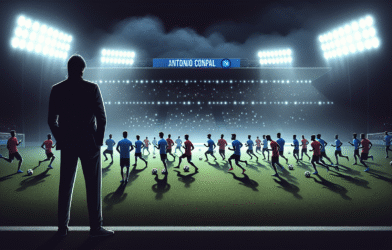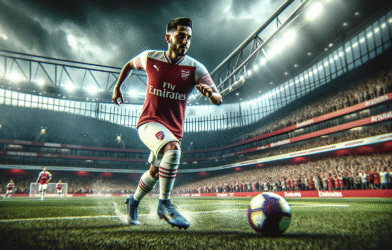Subtotal $0.00
Chelsea target Sporting striker Conrad Harder, Nicolas Jackson's future and Bayern talks
Chelsea's transfer strategy is shifting into a higher gear as they plan a refresh of their attacking options ahead of the new season. The BBC's reporting indicates that Chelsea have begun early discussions with Sporting CP to explore a permanent move for their young striker Conrad Harder, while simultaneously approaching Bayern Munich with a view to a formal, permanent bid for Nicolas Jackson. This dual-track approach is framed as part of a broader plan under manager Enzo Maresca, who is weighing several scenarios for how to reconfigure Chelsea's forward line after a disappointing goals return last term.
At the heart of the current chatter is a potential Conrad Harder Chelsea transfer that would see Chelsea pivot away from the idea of relying on Jackson as the primary focal point in attack. The talks describe a preference in Chelsea's planning to sell Jackson and invest in Harder, positioning the Sporting forward as a long-term asset capable of transforming the club's forward line. It's important to stress that any such deal hinges on a trio of conditions: both clubs agreeing terms, medicals clearing, and ancillary conditions that could influence the timetable. In other words, while the concept is being actively discussed, there are substantial procedural hurdles yet to clear.
The idea of pairing a potential Harder arrival with a Jackson exit is being portrayed as one of three routes under consideration, rather than a single, definitive plan. The club's strategic thinking, as conveyed by the BBC report, is to open up space in the wage bill and to free up the budget for a more dynamic, younger profile in the attack. If completed, the Conrad Harder Chelsea transfer would mark a significant shift in Chelsea's attacking hierarchy and would likely have immediate implications for squad balance and competition for places in forward positions across the board.
Conrad Harder Chelsea transfer discussions are taking place in a context where Chelsea's recent goal-scoring drought has not gone unnoticed within the corridors of power at Stamford Bridge. The club's leadership is keen to avoid a repeat of last season's failure to consistently breach packed defences, and Harder is viewed as a player who could offer a combination of pace, intelligence in movement, and a reliable finishing instinct that Chelsea have craved. The Sporting striker has shown in glimpses that he can operate with a high tempo and adaptability across different front-line systems, which would fit Maresca's appetite for flexibility in attack. The potential move would not just be about replacing Jackson with a like-for-like alternative; it would also be about upgrading the ceiling of Chelsea's forward options to compete more effectively across domestic and European competitions.
Of course, Chelsea's interest in the Bayern talks regarding Jackson adds another layer to the narrative. Bayern Munich's purported interest in Jackson has been a persistent thread, and it remains to be seen whether a formal bid would emerge or whether discussions would progress to more concrete terms. Any such bid would need to reflect not only Jackson's value as a player but also Chelsea's strategic priorities and financial considerations. The club's willingness to engage with Bayern on a potential sale underscores a broader willingness to trade assets in order to pursue a restructuring of the forward line that Maresca believes could yield better results on the pitch.
Crucially, even as Chelsea explore Conrad Harder Chelsea transfer avenues, the transfer timetable remains fluid. The medical, contract length, wage demands, and potential add-ons all factor into when a deal could be pushed over the line. And while the club is hopeful that talks can progress, there is a clear acknowledgement that timing will be influenced by sporting and medical contingencies as well as the willingness of Sporting CP and Bayern Munich to come to terms that satisfy both parties. The notion that a Harder arrival could come in tandem with a Jackson exit is tantalizing for Chelsea fans, but it is essential to recognize that this is not a done deal; it is a plan in motion that will require cautious, step-by-step progress through multiple checkpoints before it can become reality.
Conrad Harder Chelsea transfer: a potential game-changer for Chelsea's attack
The potential Conrad Harder Chelsea transfer, if realized, would mark a meaningful turning point in how Chelsea assemble their attacking corps. Harder's abilities—especially his movement, finishing instincts, and capacity to operate across various front-line roles—could unlock a more fluid and unpredictable attacking shape. In a league where defensive blocks are increasingly sophisticated, a forward who can drop into half-spaces, drag markers, and exploit gaps behind line-sitters can alter a team's attacking metrics. For Chelsea, the acquisition would be about more than adding a different profile; it would be about instilling a certain edge and depth that has been missing at times in the last campaign.
From a tactical standpoint, Harder's arrival could enable Maresca to experiment with multiple formations. It would give Chelsea the option to deploy a 4-3-3 with Harder as a central figure in a mobile front three, or to utilize him as part of a 4-2-3-1 when the team needs more aggression in the final third. The risk, of course, is whether the club can balance the wage bill and maintain squad harmony during a period of transition. As with any transfer of this nature, the chemistry between new signings and existing players will be a key variable in determining whether the move yields the expected on-pitch dividends.
What this could mean for Nicolas Jackson
Nicolas Jackson's future at Chelsea remains a live topic of conversation. If Chelsea proceed with a permanent approach for Conrad Harder and then move to sell Jackson, the club would be making a deliberate signal about the direction they want to take the forward line. Jackson has shown flashes of quality, but consistency and fit within Maresca's tactical framework will be closely scrutinized. A move that sees Jackson leave and Harder arrive would also alter the club's wage structure and could impact squad dynamics beyond the first-choice XI, influencing minutes, competition, and potentially the development of younger players who may be pushed into more prominent roles or loan paths as a result.
In the broader ecosystem, such a shift would be watched closely by supporters and analysts alike, as it would test Chelsea's appetite for risk and their confidence in finding the right balance between short-term fixes and long-term rebuilding. The narrative surrounding the Conrad Harder Chelsea transfer is thus not merely about a single player; it is about the strategic recalibration of Chelsea's forward line in a way that aligns with Maresca's philosophy and the club's financial constraints.
Ma r esca's three-transfer plan and Delap injury concern
Moving beyond the specifics of Conrad Harder Chelsea transfer, the broader blueprint under Maresca has drawn attention for its emphasis on agility and responsiveness to evolving circumstances. The BBC's report frames the consideration as one of three routes that Chelsea are weighing to overhaul their forward options. The other two routes are implied rather than explicitly detailed, but the central premise is a strategic triad: secure Harder through Sporting CP, potentially offload Nicolas Jackson to recoup funds, and explore alternative contingencies in the event that either leg encounters delays or setbacks.
One destabilizing factor that could accelerate decisions is the health status of Delap. The report notes concerns that Delap could be out for six to eight weeks, a setback that would leave Chelsea short on depth in forward positions during a crucial stretch of the season. In a situation like this, Maresca could be compelled to act more decisively to shore up the squad, perhaps making a quicker push on international clearance, medicals, and contract negotiations to avoid a prolonged period of adjustment during which the first-team forward options are stretched thin.
Delap's injury would also heighten the urgency of securing alternatives that can contribute immediately. This is not merely about adding depth; it's about safeguarding the club's scoring capacity and ensuring that the forward line has the different telegraphs of threat that a single-player can't provide alone. Maresca's handling of this window is likely to reflect a balancing act between risk, reward, and the need to preserve long-term financial health. Even as discussions around Harder progress, Chelsea's decision-makers will be weighing the impact of a potential Jackson sale on the squad's spare capacity, development pathways for younger players, and how best to allocate resources for a multi-faceted attack strategy.
Delap's injury and the strategic clock
The timing of Delap's absence amplifies the sense of urgency around incoming players. When a squad loses a forward of any calibre to an extended spell on the sidelines, it forces a recalibration of the immediate plan. For Chelsea, the priority becomes not only to find a player who can contribute right away but also to ensure that any new arrival connects with the team's broader tactical plan and the players already in situ. In this light, Harder's profile as a dynamic forward who can press, run, and finish could be especially appealing as a complement to Chelsea's existing attacking assets.
Deal conditions and potential timelines
As the parties hold early-stage discussions, the outlines of a possible deal remain contingent on several procedural steps. For a Conrad Harder Chelsea transfer to come to fruition, the following conditions are typically involved:
- Negotiation of a permanent transfer fee between Chelsea and Sporting CP that satisfies both clubs and reflects the player's potential value.
- Agreement on contract length, salary, bonuses, and any performance-based add-ons that align with Chelsea's wage structure and long-term planning.
- Completion of medical examinations to confirm fitness and assess any latent risks that could affect contract terms or medical viability.
- Finalization of any ancillary conditions, such as sell-on clauses, image rights arrangements, or future transfer-related clauses that might influence timelines.
- Potential biopsies of the Jackson scenario with Bayern Munich, including the timing and structure of a possible formal bid, and any corresponding countermeasures from Chelsea.
In terms of timelines, the transfer window typically offers a relatively tight window for the transfer to be completed before the season starts. Early-stage talks can move quickly if both Sporting CP and Chelsea demonstrate flexibility on price and terms, and if medicals do not reveal anything prohibitive. However, given the breadth of issues at play—especially the need to navigate two clubs and a high-profile forward in Jackson—progress could take longer than a straightforward domestic move. The presence of Delap's injury as a potential accelerant could push decision-makers toward a faster conclusion if they believe a Harder arrival would meaningfully stabilize the attack during a critical period of the campaign.
Impact on Chelsea's attack and squad dynamics
If the Conrad Harder Chelsea transfer materializes, it would ripple across Chelsea's attack and broader squad dynamics in several consequential ways. First, the direct competition for forward minutes would intensify. A successful signing of Harder would immediately push other forwards to elevate their levels to secure starting roles and important minutes in cup competitions and league games alike. The added competition could drive a more intense training week, raise the tempo of Chelsea's pressing units, and demand higher-quality finishing from all players involved in the attacking phase.
Second, the strategic balance of the forward line could shift in ways that influence formation choices. Harder's strengths could enable a more flexible approach to front three configuration or even a shift to a front two in certain situations, depending on opponent and tactical objectives. Such versatility would be valuable for Maresca as he tunes the team to maximize capabilities, exploit space, and reduce predictability for opponents. The integration process would require careful management of minutes, player relationships, and the alignment of style with the rest of the midfield and backline to maintain cohesive balance throughout matches.
Third, the financial and wage implications would be significant. A Conrad Harder Chelsea transfer would necessitate a reallocation of budget towards the longer-term contract, with potential knock-on effects on other areas of the squad. If Jackson departs, Chelsea could recoup transfer revenue and reduce the wage bill, creating room for Harder and potentially another supporting forward or winger in a broader refresh plan. This could also enable Chelsea to preserve some flexibility for future windows, ensuring that the squad remains competitive without overspending in the short term.
Finally, there is an impact on the club's relationship with Sporting CP and Bayern Munich. If a deal for Harder progresses, it could set a precedent for how Chelsea negotiates with European clubs in the market for emerging talents. It would also affect how Chelsea approaches other negotiations, including any potential pursuit of alternative targets if the Jackson-Bayern discussions evolve into a formal bid. The overall effect would be to create a climate of strategic intent, signaling to supporters and rivals that Chelsea are serious about reconfiguring their forward options with purpose and pragmatism.
In summary, the Conrad Harder Chelsea transfer, as part of a broader plan to refresh the attack, represents a notable strategic bet by Maresca and his backroom staff. While the discussions are in their early stages and dependent on several conditions, the alignment of Sporting CP's willingness to sell, Chelsea's appetite to invest in a younger profile, and the operational urgency created by Delap's injury could converge to accelerate progress. If the deal comes together, it could mark a turning point for Chelsea's attack dynamics, potentially rejuvenating their scoring threat and reshaping how the team approaches the coming season. And as always in transfer markets, the true test will be how the pieces fit on the pitch once players don the Chelsea shirt and the whistle sounds for competitive action.
For readers following the nuances of this developing story, the key takeaway remains clear: the Conrad Harder Chelsea transfer is not simply about replacing a player but about executing a broader strategic pivot designed to restore Chelsea's attacking potency, while managing the realities of a modern football economy where risk and reward must be balanced with fiscal discipline.















